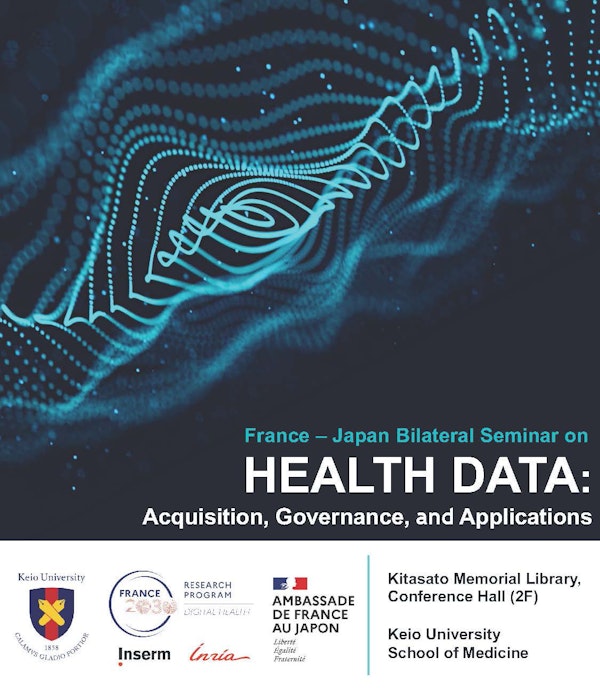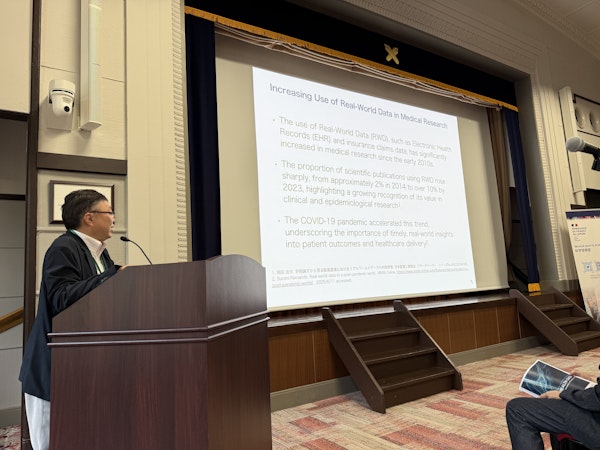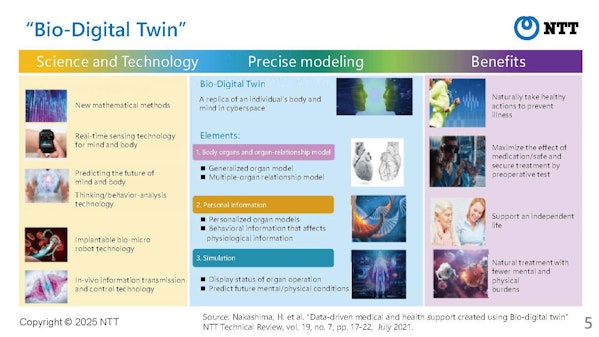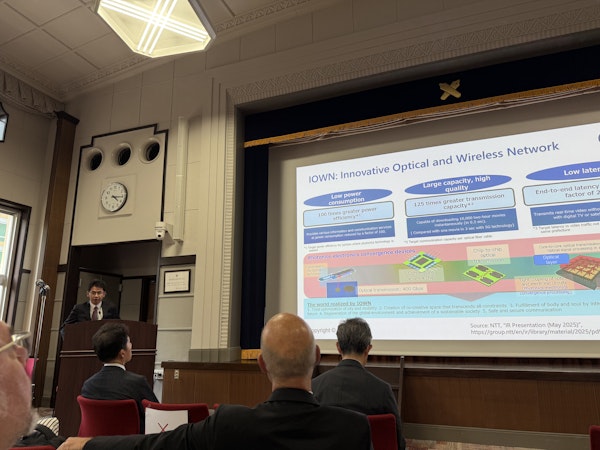
Japanese version of this article https://www.ntt-precisionmedicine.co.jp/news/single/?id=20250805
French version of this article (machine translation) https://www.ntt-precisionmedicine.co.jp/news-jpp-en/single/?id=20250805jppfr
On June 19 (Thu) and 20 (Fri), 2025, the “France–Japan Bilateral Seminar on Health Data: Acquisition, Governance, and Applications” was held at the Kitasato Hall, Keio University School of Medicine in Tokyo.
This international academic seminar brought together researchers, policymakers, and professionals from both France and Japan to discuss the acquisition, governance, and application of health data. The event served as a platform for sharing the latest insights and exploring future directions in the field.
From NTT Group, three experts participated as speakers—including two from NTT Precision Medicine Corporation. They presented on the current challenges and technical foundations for utilizing medical data, as well as the potential of digital twin technologies to revolutionize future healthcare.
NTT Group participated in two key sessions
●Session 5.1「Japan Precision Medicine Platform – Utilization of Medical Data」
o Introducing the implementation and background of the Japan Precision Medicine Platform (JPP), a national-scale initiative for medical data utilization.
●Session 5.4「Toward the Digital Twin: Bridging Industry and Research」
o Discussing the vision of digital twin-based healthcare systems from an international and interdisciplinary perspective.

The seminar was conducted entirely in English and welcomed nearly 100 participants onsite, including guests from overseas medical and research institutions. The sessions sparked lively discussions and highlighted the strong global interest in health data strategies.
This report provides detailed information on NTT Group's presence and presentations at this event.
Session 5.1“Japan Precision Medicine Platform – Utilization of Medical Data”
In this session, NTT Precision Medicine Corporation introduced its initiatives for real-world data (RWD) utilization and the technical infrastructure supporting them.
Speakers and Highlights:
■ Katsuo Inaya (NTT Precision Medicine Corporation)

“Overview and Vision of the Japan Precision Medicine Platform (JPP)”
In Japan, over 95% of medical data accumulated in hospitals remains unused, often locked in isolated data silos. Due to the massive volume of data and complex regulations around privacy protection, data-sharing with external research or pharmaceutical organizations remains difficult.

To address these challenges, NTT Group, in collaboration with BC Platforms, has developed the Japan Precision Medicine Platform (JPP)—a secure and practical infrastructure for medical data sharing. The platform is built upon two pillars:
- Federated Analysis: Enables cross-institutional analysis without aggregating raw data.
- Trusted Research Environment (TRE): Allows safe data analysis without extracting sensitive patient information.
JPP aims to accelerate clinical development and address Japan’s “drug loss” issue, where 86 out of 143 globally approved drugs had not yet been developed domestically as of March 2023. Through secure cross-institutional access and analysis, JPP provides pharmaceutical companies and researchers with powerful infrastructure to overcome development hurdles.

■ Dr. Masafumi Okada(Prime Research Institute for Medical RWD, Inc.)

“Challenges and the Importance of Trusted Research Environments (TRE)”

Dr. Okada discussed the practical limitations of RWD use and emphasized the importance of technologies such as federated analysis and TRE. Traditional anonymized databases lack critical patient background data—such as smoking history or genetic information—limiting their effectiveness in drug discovery or epidemiological research.
TRE, built on the "Five Safes" principle (safe people, projects, data, environments, and outputs), allows detailed analysis within hospital boundaries, ensuring both privacy and analytical rigor.
As a case study, Dr. Okada presented a safety comparison of coronary artery stents involving over 9,000 patients across three institutions. Each hospital executed standardized analytic programs locally, with only aggregate results shared—successfully balancing privacy with analytic effectiveness.

■ Itsutaro Imahori, CFA (BC Platforms)

“AI-Enabled Use Cases and TRE Implementation”
Mr. Imahori highlighted international use cases involving BC Platforms’ TRE infrastructure, including partnerships with the UK’s NHS and HDR UK, and the HELIOS project in Singapore. These examples showcase how AI and NLP (natural language processing) are being used to extract valuable insights from unstructured electronic medical records (EMRs) in secure environments.

The TRE architecture supports both on-premises and cloud deployment, and allows for integration with AI agents. In Japan, the technology is already supporting the implementation of JPP, enabling safe, scalable sharing of high-dimensional data—including for rare diseases—among multiple medical institutions and pharmaceutical partners.

Q&A and Future Outlook
During the Q&A, a French participant raised a question about interoperability with European health data initiatives like TrinetX. In response, Mr. Imahori emphasized that “AI-powered standardization of common data models and the use of language models can provide flexible solutions,” hinting at the potential for international harmonization.
Panelists also pointed out the importance of policy support, user training, and operational readiness to ensure the successful deployment of these technologies in real-world settings.
Summary of Session 5.1
This session reaffirmed the importance of secure and efficient infrastructure like JPP for promoting RWD-based research and drug development. It highlighted that addressing the challenges of health data utilization requires not only technical innovation, but also institutional frameworks, ethical considerations, and stakeholder collaboration.
JPP's federated and TRE-based architecture holds promise as a model for both domestic and global expansion of medical data ecosystems.
“Toward the Digital Twin: Bridging Industry and Research”
Speaker: Dr. Kunio Kashino (Fellow, NTT Corporation)
Affiliation: NTT Bio-Medical Informatics Research Center / NTT Communication Science Laboratories

This session focused on the theme of “digital twin” technology and its role in shaping the future of healthcare. Experts from academia and industry across Japan and France gathered to share perspectives on cutting-edge technologies and their social implementation.
Presentation Title:Future of Healthcare Enabled by New ICT and AI
Overview:
Dr. Kashino opened by presenting NTT’s long-standing vision: the IOWN (Innovative Optical and Wireless Network) initiative, which aims to create a next-generation communication infrastructure based on ultra-high-speed and low-latency photonic technologies.
He then introduced the Bio-Digital Twin concept—a system that replicates and simulates a person’s physical and psychological state in cyberspace using real-time sensing. This enables the prediction of health risks, optimization of treatment strategies, and promotion of behavioral change.

Key Topics Covered:
· Overview of IOWN: A foundational shift toward ultra-efficient communication for life sciences and healthcare.
· Structure of the Bio-Digital Twin: Integrating organ models, personal health data, behavioral analytics, and AI simulations.
· Use Cases: Examples from collaboration with Osaka University and Sakakibara Heart Institute, including heart rehabilitation and personalized health monitoring.
· Building an Ecosystem: Emphasized the need for multidisciplinary collaboration across universities, companies, and medical institutions to transition from research to real-world implementation.

The subsequent panel discussion invited speakers to share their perspectives on the social impact and ethical considerations of digital twin technology.

Throughout the session, the importance of not only technology-based research and development but also social consensus-building within an international framework was reaffirmed, and expectations for strengthening cooperation between France and Japan were raised.
Summary of Session 5.4
Session 5.4 provided a compelling vision of future healthcare powered by the convergence of cyberspace and real-world data. The Bio-Digital Twin concept, in particular, demonstrated how personalized, predictive, and preventive care could become a reality.
Dr. Kashino’s presentation conveyed not just technological ambition but a broader vision for societal transformation—highlighting NTT’s central role in shaping a new paradigm for healthcare.
Overall Summary
This seminar served as a unique opportunity to present both practical solutions (Session 5.1) and future-oriented visions (Session 5.4) from NTT Group. Through these dual perspectives, the company illustrated its comprehensive approach to enabling data-driven, patient-centric healthcare.
NTT Group remains committed to collaborating with domestic and international partners to accelerate the real-world implementation of next-generation healthcare—powered by AI, ICT, and real-world data.
※本記事は機械翻訳です
※This article is machine translated.
※Cet article est une traduction automatique.


